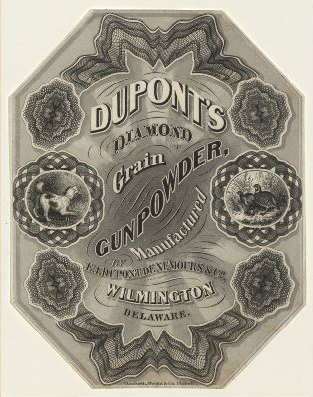John and William Warner, 1809-1811
Brothers John and William Warner began a business partnership in 1793 and were soon providing packet service between Philadelphia and Wilmington on the ships "Charlotte," "Hope," and "Julia."
Eventually, however, they parted ways. John maintained the shipping business in Philadelphia and William opened a store in Wilmington. The Warners were close friends of E.I. du Pont and also some of the earliest agents to sell DuPont gunpowder. The Warners brought over the Barrett family in 1809 as well as an unnamed person on the "Medford" in 1911.
John Welsh, 1823-1829
John Welsh worked as a clerk in a Philadelphia counting house before starting his own shipping firm. He was the originator and director of the Philadelphia Bank as well as two insurance agencies. In addition to procuring passages for immigrants, Welsh also imported raw materials including brimstone for E.I. du Pont de Nemours and Company.
Robert Taylor, 1830-1855
In 1799, at the age of 25, Robert Taylor emigrated to Philadelphia from Carrickshanrim, County Donegal, Ireland. He founded the shipping firm Robert Taylor & Co., which later included his son, James L. Taylor, as well as Thomas Ferguson and Hugh Cassidy.
The company arranged passages from both Londonderry and Liverpool and also sent drafts overseas through James Corscaden & Co. in Londonderry. The firm regularly advertised in Philadelphia newspapers.
Taylor served as Director of the Bank of the United States and also held positions of office in the Society for the Friendly Sons of St. Patrick for almost fifty years.
Washington Rice, 1833
DuPont arranged the majoirty of their passages through independent agents. The company had the longest relationship with Robert Taylor, who booked passages for DuPont from 1830 to 1850 and then again in 1854.
Other agents, such as James C. Aiken and Andrew C. Craig, worked with the company for just one season. The company was not afraid to switch agents to secure a cheaper price for tickets. Most of the agents, with the exception of George McHenry, did not own the ships on which they booked passages. Rather, the agents worked in tandem with agents in Londonderry and Liverpool to secure berths on various ships.
James C. Aiken, 1837
Not much is known about James C. Aiken. He booked approximately thirty passengers in 1837, though almost two-thirds of them were subsequently canceled and rebooked with other agents. Customers may have been swayed by the fact that Aiken charged $20.00 for a ticket from Londonderry, as opposed to the $25.00 that Robert Taylor charged at the same time.
The cancelations coupled with Aiken's subsequent disappearance from DuPont's records seem to suggest that either DuPont or the workers who were sponsoring passengers were not happy with Aiken's work.
Andrew C. Craig, 1847
Andrew C. Craig emigrated from Coleraine, County Derry, Ireland to Philadelphia in 1826, at the age of 16. Craig and Andrew J. Catherwood were business partners in the wholesale liquor firm Catherwood & Craig until the firm's dissolution in October of 1847.
Craig arranged passages for over 100 immigrants at the height of the Famine. After the dissolution of Catherwood & Craig, Catherwood took over the business of arranging passages. Craig then partnered with his brother Joseph to continue selling wholesale liquor. He also served as an officer in the Society for the Friendly Sons of St. Patrick for thirty years.
Andrew J. Catherwood, 1848-1854
Andrew J. Catherwood was a partner in the wholesale liquor firm Catherwood & Craig until the firm's dissolution in October of 1847, at which point he took over the work of arranging passages from Andrew C. Craig.
Catherwood later worked with the family-owned distillery and liquor distribution firm, H. & H.W. Catherwood in Philadelphia. His brother, H. Wilson Catherwood, sometimes helped with passage arrangements when A.J. Catherwood was out of town. H. Wilson later arranged passages himself.
H. Wilson Catherwood, 1854
H. Wilson Catherwood was a partner with his father in the distillery and liquor distribution firm, H. & H.W. Catherwood in Philadelphia. A brother to Andrew J. Catherwood, H. Wilson began helping A.J. with passage orders when he was out of town. In 1854, he arranged passages on his own for approximately forty people.
George McHenry, 1851-1853
George McHenry was the owner of the George McHenry & Co. Philadelphia and Liverpool Line of Packets, which operated the packet ships "Berlin," "Mary Pleasants," "Shenandoah," "Shackamaxon," and "Westmoreland" between Liverpool and Philadelphia.
In addition to booking passages from Liverpool on his ships, McHenry also offered drafts drawn on the Liverpool firm of his brother, James McHenry. McHenry lived in Philadelphia and was a political writer and influential Democrat who supported secession and the Confederacy. McHenry acted as an agent for the Confederate government in England during the Civil War.
 DuPont Company View
DuPont Company View
